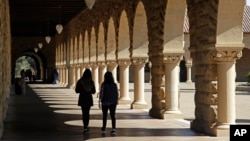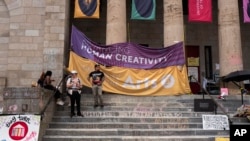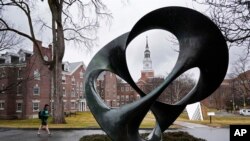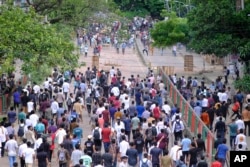Student Union
- By Julie Taboh
Harvard Professor Arrest Highlights Intellectual Property Espionage

The recent arrest of a renowned Harvard professor and pioneer in nanoscience sheds light on relationships between American brain power, the Chinese government and funding between the two that involves intellectual property theft.
Charles Lieber, head of Harvard University's chemistry department and a world leader in nanoscience, appeared in a jumpsuit and leg shackles in court in Boston on Jan. 28 when he was charged with lying about receiving funding from Chinese research agencies. Lieber was simultaneously receiving research funding from the U.S. Department of Defense and the National Institutes of Health.
The government alleges that Lieber hid being paid up to $50,000 a month by the Chinese government. He also received more than $1.5 million to create a research lab at Wuhan University of Technology in China, according to court documents.
“This is a small sample of China's ongoing campaign to siphon off American technology and know-how for Chinese gain," said Andrew Lelling, U.S. Attorney for the District of Massachusetts in a press conference when Lieber was charged. Lelling led the investigation.
Thursday, U.S. Attorney General William Barr, FBI Director Christopher Wray and Lelling highlighted stepped up efforts to combat Chinese espionage at a conference in Washington, citing the relationships between academics and Chinese funding.
Lieber is alleged to have participated in China's “Thousand Talents Plan,” a campaign to attract American and other specialists worldwide to accelerate its own academic, research and industry efforts.
U.S. colleges, universities, research labs, and industry partners are struggling with how to identify what they see as Chinese coercion and intellectual property theft. Lieber’s arrest is the latest in a string of academics charged with taking funding from Chinese interests or the Chinese government without disclosing it.
Mark Cohen, senior fellow at the University of California Berkeley Center for Law and Technology, told VOA that “this flurry of lawsuits and defunding and a re-examination of bilateral science cooperation … is significant.”
“It shows how pervasive” coercion and questionable funding has become.
Last year a University of Kansas researcher was charged with collecting federal grant money while working full time for a Chinese university.
A Chinese government employee was arrested in a visa fraud scheme that the Justice Department says was aimed at recruiting U.S. research talent.
A university professor in Texas was accused in a trade secret case involving circuit board technology.
The National Institutes of Health (NIH) announced last year that it is investigating whether a dozen researchers there failed to report taking funding from foreign governments, specifically China.
The year before the agency sent a letter to more than 10,000 research institutions urging them to ensure that NIH grantees are properly reporting their foreign ties.
There are some “bad actors out there, but on the other hand, there is also a need for cooperation … a lot of scientists are being encouraged to develop collaborative relationships with Chinese entities,” Cohen said.
Most American scientists and researchers are used to an open environment, he said. Foreign students working on research “for the most part, they aren't working in universities on classified material.”
Cohen advocates stricter guidelines, which some universities have in place, while many do not.
“I think China does have a lot to account for, in this rash of cases, and of some of the other economic espionage cases of the past,” Cohen said. It would helpful too, he added, if China had its own guidelines “to ensure that they were not creating conflicts of interest.”
“We need collaboration. But we just need to do it the right way.”
See all News Updates of the Day
Survey: Social integration, career prep are important to international students

A recent survey of international students in the United States found that before starting school, they were concerned about personal safety, making friends and feeling homesick.
Inside Higher Ed reports that international students want specialized orientations, peer connections, career preparation and job placement to help make their college experiences successful. (July 2024)
US advisory council ends Nigeria visit, signs student exchange deal

Members of a U.S. presidential advisory council have approved a student exchange deal between an American college and a Nigerian university as part of the council's effort to strengthen collaboration on education, health, entrepreneurship and development between Africa and Africans living abroad.
The council also visited a health facility supported by the United States Agency for International Development in the capital.
Nigerian authorities and visitors chatted with members of the U.S President's Advisory Council on African Diaspora Engagement as they toured a healthcare facility in Karu, a suburb of Abuja, on the last day of the council's three-day visit to Abuja and Lagos.
The facility is one of many supported by the United States Agency for International Development, or USAID, to improve the management of childhood illnesses, family planning, immunization and delivery.
The tour was part of the council's effort to promote African diaspora-led investments in technology entrepreneurship, education and healthcare delivery.
"They're doing a phenomenal job there, it really gave us a sense of what the healthcare system is in Nigeria," said Deniece Laurent-Mantey, executive director of the advisory council. "This is our first trip as a council to the continent and we chose Nigeria for a reason — the diaspora in Nigeria is very active, very influential, and they're really a source of strength when it comes to our U.S.-Africa policy. And so for us coming to Nigeria was very intentional."
The council was created by President Joe Biden in September to improve collaboration between Africa and its diaspora in terms of economic and social development.
Akila Udoji, manager of the Primary Healthcare Centre of Karu, said officials in Nigeria were pleased that the council members were able to visit.
"We're happy that they have seen what the money they have given to us to work with has been used to do, because they have been able to assist us in capacity-building, trainings, equipment supply and the makeover of the facility," Udoji said.
Earlier, the council signed a deal for a student exchange program between Spelman College in the southern U.S. city of Atlanta and Nigeria's University of Lagos.
Laurent-Mantey said education exchanges are one of the council's top priorities.
"In Lagos, we had the president of Spelman College — she's also a member of our council — she signed an agreement with the University of Lagos to further education exchange programs in STEM and creative industries between those two universities," Laurent-Mantey said. "And I think for us it's very important, because Spelman College is a historically Black university, and so here we are promoting the importance of collaboration between African Americans and Africans."
In March, the advisory council adopted its first set of recommendations for the U.S. president, including the student exchange initiative, advocating for more U.S. government support for Africa, climate-focused initiatives, and improving U.S. visa access for Africans.
The council met with Nigerian health and foreign affairs officials during the visit before leaving the country on Wednesday.
American Academy of the Arts College announces closure

The American Academy of Art College in Chicago announced it would be closing after 101 years of preparing students for careers in art and illustration.
WTTW news reported that like other art colleges, the academy saw enrollment drop after the pandemic, and officials made the decision to close the college last month. (July 2024)
5 killed, dozens injured in clashes over Bangladesh jobs quota system

At least 5 people were killed and dozens injured in two separate incidents in Bangladesh as violence continued Tuesday on university campuses in the nation's capital and elsewhere over a government jobs quota system, local media reports said quoting officials.
At least three of the dead were students and one was a pedestrian, the media reports said. Another man who died in Dhaka remained unidentified.
The deaths were reported Tuesday after overnight violence at a public university near Bangladesh's capital, Dhaka. The violence involved members of a pro-government student body and other students, when police fired tear gas and charged the protesters with batons during the clashes, which spread at Jahangir Nagar University in Savar, outside Dhaka, according to students and authorities.
Protesters have been demanding an end to a quota reserved for family members of veterans who fought in Bangladesh's war of independence in 1971, which allows them to take up 30% of governmental jobs.
They argue that quota appointments are discriminatory and should be merit-based. Some said the current system benefits groups supporting Prime Minister Sheikh Hasina. Some Cabinet ministers criticized the protesters, saying they played on students' emotions.
The Bengali-language Prothom Alo daily newspaper reported that one person died in Dhaka and three others, including a pedestrian, were killed after they suffered injuries during violence in Chattogram, a southeastern district, on Tuesday.
Prothom Alo and other media reports also said that a 22-year-old protester died in the northern district of Rangpur.
Details of the casualties could not be confirmed immediately.
While job opportunities have expanded in Bangladesh's private sector, many find government jobs stable and lucrative. Each year, some 3,000 such jobs open up to nearly 400,000 graduates.
Hasina said Tuesday that war veterans — commonly known as "freedom fighters" — should receive the highest respect for their sacrifice in 1971 regardless of their current political ideologies.
"Abandoning the dream of their own life, leaving behind their families, parents and everything, they joined the war with whatever they had," she said during an event at her office in Dhaka.
Protesters gathered in front of the university's official residence of the vice chancellor early Tuesday when violence broke out. Demonstrators accused the Bangladesh Chhatra League, a student wing of Hasina's ruling Awami League party, of attacking their "peaceful protests." According to local media reports, police and the ruling party-backed student wing attacked the protesters.
But Abdullahil Kafi, a senior police official, told the country's leading English-language newspaper Daily Star that they fired tear gas and "blank rounds" as protesters attacked the police. He said up to 15 police officers were injured.
More than 50 people were treated at Enam Medical College Hospital near Jahangir Nagar University as the violence continued for hours, said Ali Bin Solaiman, a medical officer of the hospital. He said at least 30 of them suffered pellet wounds.
On Monday, violence also spread at Dhaka University, the country's leading public university, as clashes gripped the campus in the capital. More than 100 students were injured in the clashes, police said.
On Tuesday, protesters blocked railways and some highways across the country, and in Dhaka, they halted traffic in many areas as they vowed to continue demonstrating until the demands were met.
Local media said police forces were spread across the capital to safeguard the peace.
Swapon, a protester and student at Dhaka University who gave only his first name, said they want the "rational reformation of the quota scheme." He said that after studying for six years, if he can't find a job, "it will cause me and my family to suffer."
Protesters say they are apolitical, but leaders of the ruling parties accused the opposition of using the demonstrations for political gains.
A ruling party-backed student activist, who refused to give his name, told The Associated Press that the protesters with the help of "goons" of the opposition's Bangladesh Nationalist Party and Jamaat-e-Islami party vandalized their rooms at the student dormitories near the Curzon Hall of Dhaka University.
The family-of-the-veterans quota system was halted following a court order after mass student protests in 2018. But last month, Bangladesh's High Court nulled the decision to reinstate the system once more, angering scores of students and triggering protests.
Last week, the Supreme Court suspended the High Court's order for four weeks and the chief justice asked protesting students to return to their classes, saying the court would issue a decision in four weeks.
However, the protests have continued daily, halting traffic in Dhaka.
The quota system also reserves government jobs for women, disabled people and ethnic minority groups, but students have protested against only the veterans system.
Hasina maintained power in an election in January that was again boycotted by the country's main opposition party and its allies due to Hasina's refusal to step down and hand over power to a caretaker government to oversee the election.
Her party favors keeping the quota for the families of the 1971 war heroes after her Awami League party, under the leadership of her father, Sheikh Mujibur Rahman, led the independence war with the help of India. Rahman was assassinated along with most of his family members in a military coup in 1975.
Police open hazing investigation after Dartmouth student found dead

Police have opened a hazing investigation after a Dartmouth College student was found dead in a river in early July.
Police received a tip that hazing was involved, and there was evidence that alcohol might have been involved in the death, USA Today reported. (July 2024)









